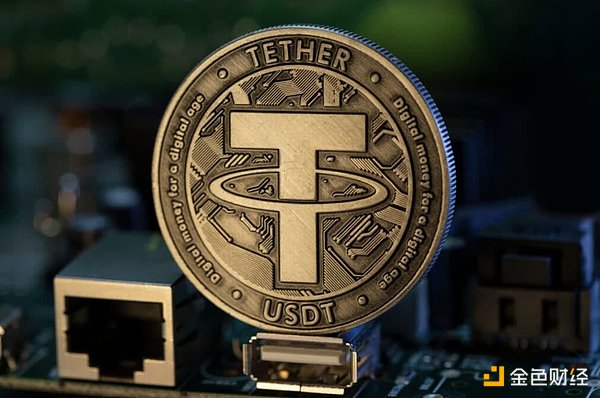
Author: Veronica Irwin Source: unchainedcrypto Translation: Shan Oppa, Golden Finance
Since its establishment, Tether Always stuck in FUD, but this time, it may face its biggest challenge to date. The newly proposed stablecoin bill in the U.S. Congress may prohibit Tether from issuing USDT in the United States.
This does not mean that Tether will be immediately removed from the shelves by exchanges such as Coinbase, Kraken or Gemini, but if compliance options are not found, the new bill may limit Tether's growth.
The current question is: Can Tether—a company with deep ties with Trump—find a solution?
The Stablecoin Act may squeeze the $140 billion Tether marketThe U.S. Congress is pushing for a new stablecoin regulation bill to try to regulate the $200 billion industry . Of these, two bills may prohibit Tether from issuing new USDT in the United States unless it can meet strict audit and compliance requirements.
Two new bills passed by the U.S. Congress may prohibit El Salvador-based Tether from The United States issues new USDT digital dollars. The token may also be removed from major exchanges such as Coinbase, Kraken and Gemini. According to CoinGecko, USDT is the world's largest stablecoin with a market capitalization of approximately $141 billion.
The Guidance and Establishment of the U.S. Stablecoin Innovation Act (GENIUS) was introduced in the Senate by Republican Senator Bill Hagerty of Tennessee on Tuesday and was introduced by Carolina State Republican Senator Tim Scott, Wyoming Republican Senator Cynthia Loomis and New York Democratic Senator Kirsten Gillibrand signed. The bill would prohibit companies that do not maintain one-to-one reserves and own U.S. accounting firms from issuing stablecoins in the United States.
A supporting bill in the House (a draft of discussion was released on Thursday) also has similar compliance requirements. The bill is called "2025 Stable CoinTransparency and Accountability Promotes Better Ledger Economy Act (STABLE), introduced by French Hill, Chairman of the House Financial Services Committee (R.A.) and Bryan Steil, Chairman of the Digital Assets Subcommittee. A congressional staff member familiar with the text of the bill explained: Tether needs to comply with the same rules as all other stablecoin issuers—either comply or exiting the U.S. market. ”
Although Tether provides quarterly proof of assets (Attestations), which is reviewed by accounting firm BDO, a comprehensive audit has not been completed so far.
Latest financial report (released last week) shows that Tether has $143 billion in assets, while USDT's circulating supply was $137 billion at the time. However, Tether still has not found a willingness to provide comprehensive The U.S. accounting firm for auditing.
Tether CEO Paolo Ardoino had previously expressed his willingness to undergo an audit, but said no U.S. company would accept them as a client. In an interview with Forbes in July 2024, he said: “A large auditing company may serve 50,000 banks, each of which may pay them $1 million a year. Imagine you have these 50,000 banks and then you have a stablecoin company. What would your 50,000 customers think if you join a stablecoin that is probably its most powerful competitor? Therefore, it is not easy to sell as the Big Four accounting firms (Deloitte, PwC, KPMG and Ernst & Young). ”Tether did not respond to a request for comment.
Tether's biggest competitor is the $56 billion USDC issued by Boston's Circle Financial, audited by Deloitte and regularly issued certificates.
Compliance requirements of two Congressional bills could also complicate U.S. exchanges in deciding whether to keep USDT on their platform. Late last year, the Assets are delisted from many well-known European exchanges that must comply with the landmark Crypto Asset Markets legislation (MiCA). Although so far, neither Congressional bill has made this clear requirement.
< p style="text-aligno: left;">"While exchanges regulated by the U.S. may prioritize compliant stablecoins, delisting is not an automatic requirement," explained Laurenth Alba, attorney and head of business development at Rome Agreement. "Instead, the exchange Risks will be assessed and some platforms may voluntarily reduce risks or restrict US customers from trading USDTs if Tether does not obtain a federal or state-issued stablecoin license to avoid regulatory risks. ” Coinbase, Kraken and Gemini did not respond to requests for comment.Tether’s possible compliance opportunities?The situation may change even if USDT does not delist on the exchange A lawyer who has studied stablecoin legislation believes that the upcoming market structure bill will likely instruct cryptocurrency companies to work with regulated stablecoin issuers, “if you are going to create a reward for those who comply with the rules. Regulations, you also have to take steps to make it harder for people who do not comply with the rules to operate,” he explained.
Neither of the bills are for Tether or any other agency Grateful periods are provided to meet all provisions. However, the supporting bill may still take months to pass in both houses of Congress and eventually signed into law by President Donald Trump.
One factor that might help Tether is that Trump nominated head of Commerce and the billionaire CEO of asset management company Cantor Fitzgerald is a long-time business partner and investor of the company. Lawyers familiar with stablecoin legislation explained that they believe Tether is “not short of resources” and can comply with regulations if they want.













